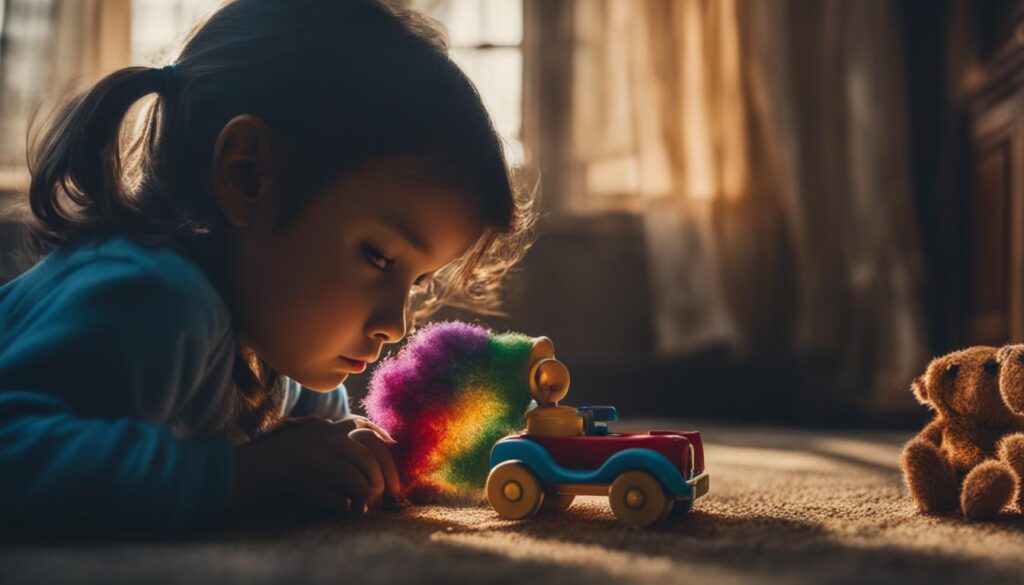We may earn money or products from the companies mentioned in this post.
Infidelity is a widespread issue in many romantic relationships, and its effects can be far-reaching. Children are often the unintended victims of infidelity, and it can have a significant impact on their emotional well-being and development. Understanding the effects of infidelity on children is crucial for parents and caregivers to support them through this difficult experience.
Children who experience infidelity in their family may struggle with feelings of betrayal, anger, and confusion. The psychological impact of infidelity can be long-lasting, causing trust issues and low self-esteem. It is essential for parents to recognize the potential impact of infidelity on their children’s emotional well-being and work to address it.
Key Takeaways
- Infidelity can have a significant impact on children’s emotional well-being and development
- Children may experience feelings of betrayal, anger, and confusion as a result of parental infidelity
- The psychological impact of infidelity can be long-lasting, causing trust issues and low self-esteem
- Recognizing and addressing the impact of infidelity on children is crucial for supporting their emotional recovery
- Parents should seek professional help when needed to support their children through infidelity
The Emotional Trauma of Infidelity
Infidelity can have devastating consequences for children and their emotional well-being. When a parent cheats, it can cause a range of complex emotions in their children, including feelings of betrayal, anger, sadness, and confusion.
The emotional trauma that children experience as a result of parental infidelity can have long-lasting effects. It can impact their sense of security, trust, and attachment, potentially leading to psychological issues, such as anxiety and depression.
According to research, children of parents who have been unfaithful are at a greater risk of developing behavioral problems and difficulties with relationships later in life.
The Consequences of Parental Infidelity
The consequences of parental infidelity can be significant and enduring. Children who experience infidelity in their family may struggle with a range of issues, including:
- Low self-esteem and self-worth
- Difficulty trusting others
- Feelings of guilt, shame, and anger
- Anxiety and depression
- Behavioral problems, such as acting out and aggression
- Problems forming healthy relationships in the future
It’s important for parents to understand how their actions can impact their children and to take steps to mitigate the emotional damage caused by infidelity.
“Parents should be aware that infidelity can cause severe emotional damage to their children, and take the necessary steps to protect them from such trauma.” – Dr. Jane Adams, Psychologist
By acknowledging the impact of infidelity and providing support for their children, parents can help their children to cope with the emotional turmoil caused by this traumatic experience.
Infidelity and Child Development: Exploring the Long-Term Effects of Infidelity on Children
Infidelity can have a significant impact on a child’s overall development and well-being. Children who experience infidelity in their family may struggle with various emotional and psychological issues that can affect them well into adulthood.
One of the primary long-term effects of infidelity on children is the disruption of their sense of security and attachment. Children often view their parents as the primary sources of safety and stability in their lives. When infidelity occurs, it can shatter this perception and leave children feeling confused and uncertain about their place in the family.
Effects on Emotional and Social Development
Infidelity can also affect a child’s emotional and social development. Children may experience feelings of guilt, shame, and anger as a result of their parent’s behavior. They may also struggle with trust issues and have difficulty forming secure relationships in the future.
Furthermore, children who are exposed to ongoing conflict and tension related to infidelity may experience adverse effects on their mental health, including anxiety, depression, and other stress-related disorders.
Factors that Influence the Impact of Infidelity
It’s important to note that the impact of infidelity on children can vary depending on a variety of factors, including their age and developmental stage, the duration and severity of the infidelity, and the level of conflict and tension within the family.
For example, younger children may have a more difficult time processing and understanding the complexities of infidelity, while older children may be more aware of the implications and consequences of their parent’s behavior.
Addressing the Impact of Infidelity on Children
Parents and caregivers can take steps to help children navigate the impact of infidelity on their lives. This may include seeking professional counseling or therapy for both the child and the family as a whole. Open communication, validation, and support can also go a long way in helping children cope with the emotional turmoil caused by infidelity.
Furthermore, promoting a sense of stability and routine in children’s lives can help them feel a sense of security and attachment even in the midst of turmoil. By prioritizing the needs and emotional well-being of their children, parents can help mitigate the long-term effects of infidelity and promote healthy development.
Coping with Infidelity in Families: Helping Children through Infidelity
Dealing with infidelity can be an emotionally challenging time for families, especially for children. Parents play a crucial role in helping their children cope with the impact of infidelity. It is important to provide emotional support, reassurance, and guidance to help children navigate through their feelings and emotions.
Promote Open Communication
Communication is key when it comes to coping with infidelity in families. It is important to create a safe and non-judgmental environment where children feel comfortable expressing their thoughts and feelings. Encourage open communication by actively listening to what they have to say without interruption and showing empathy towards their feelings.
Seek Professional Help
Professional help can provide valuable guidance and support for families coping with infidelity. Therapists and counselors can offer a safe space for children to express their emotions and help them build coping mechanisms to deal with the impacts of infidelity.
Validation
Validation is a crucial component in helping children through infidelity. It is important to validate their feelings and emotions, letting them know that their feelings are real and understandable. Reassure them that they are not alone and that it is normal to have a range of emotions.
Create Stability
Infidelity can disrupt the sense of stability that children rely on in their lives. It is important to create a stable and predictable environment for them to feel safe in. This can be achieved by maintaining consistent routines, sticking to predictable schedules, and providing a sense of structure in their lives.
Overall, coping with infidelity can be challenging for families, but it is important to remember that there is hope for healing. By promoting open communication, seeking professional help, validating their feelings, and creating stability, parents can help their children navigate through the difficult emotions and move forward towards a brighter future.
Healing from Infidelity for Children
Healing from the trauma of infidelity is a process that requires time, patience, and understanding. It is especially important for children, who often bear the brunt of the emotional fallout caused by infidelity in their families.
Validation: One of the first steps in healing from infidelity is to validate a child’s feelings. Children of all ages need to know that their feelings are normal and that they are not alone in their experiences. Parents can offer validation by simply listening to their children, acknowledging their emotions, and reassuring them that they are loved and cared for.
Therapy: Therapy can be a valuable asset in the healing process for children who have experienced infidelity. A licensed therapist can provide a safe and non-judgmental space for children to express their feelings, process their emotions, and learn healthy coping strategies. Parents can seek out therapists who specialize in working with children and families affected by infidelity.
| Benefits of Therapy for Children: | Examples of Healthy Coping Strategies: |
|---|---|
|
|
Creating a Safe and Stable Environment: Children who have experienced infidelity in their families may feel a sense of instability and insecurity. Parents can help promote healing by providing a safe and stable environment for their children. This can include maintaining consistent routines, setting clear boundaries, and offering plenty of love and affection.
Encouraging Open Communication: Children need to feel that they can talk openly about their feelings and experiences. Parents can encourage open communication by creating a safe and non-judgmental space for their children to share their thoughts and emotions. It’s important for parents to listen actively and respond with empathy and understanding.
Promoting Resilience in Children
In addition to seeking help and support, it’s also important to promote resilience in children who have experienced infidelity. Resilience can help children bounce back from difficult experiences and develop the tools they need to navigate the challenges they may face in the future.
Positive Coping Mechanisms: Encouraging children to develop positive coping mechanisms can help build their resilience. This can include engaging in physical activity, practicing mindfulness, or pursuing creative outlets like writing or art.
“Resilience is not what happens to you. It’s how you react to, respond to, and recover from what happens to you.” – Jeffrey Gitomer
Support Systems: Building a strong support system can also foster resilience in children. This can include close relationships with family members, friends, or a supportive community. Children who feel connected to others and have people they can turn to during difficult times are more likely to develop resilience.
Fostering Self-Esteem: A healthy sense of self-esteem can also promote resilience in children. Parents can help foster their child’s self-esteem by offering praise and recognition for their accomplishments, encouraging them to pursue their interests, and providing opportunities for them to take on new challenges and responsibilities.
Healing from infidelity is a complex and challenging process, but with the right support, children can recover and develop the resilience they need to thrive.
Promoting Resilience in Children
Infidelity can have a significant impact on children, causing emotional turmoil and disrupting their sense of security and attachment. However, there are ways to promote resilience in children and support their emotional well-being in the aftermath of infidelity.
Here are some strategies for promoting resilience in children:
- Create a supportive environment: Children need a safe and stable environment where they feel comfortable expressing their emotions and seeking support when needed. Encourage open communication and provide a sense of consistency and routine in their daily lives.
- Encourage positive coping mechanisms: Teach children healthy ways to cope with their emotions and stress, such as mindfulness, exercise, and creative outlets like drawing or writing. Avoid negative coping mechanisms like substance abuse or self-harm.
- Build a strong support system: Children benefit from having a network of supportive adults, such as grandparents, teachers, or counselors. Encourage them to build healthy relationships and seek support when needed.
- Promote self-esteem: Infidelity can lower children’s self-esteem and confidence. Encourage children to develop a positive self-image by recognizing their strengths, setting achievable goals, and offering validation and praise for their accomplishments.
“Resilience is not what happens to you. It’s how you react to, respond to, and recover from what happens to you.” – Jeffrey Gitomer
It’s important to remember that promoting resilience in children is an ongoing process, and it may take time for them to heal from the emotional impact of infidelity. Offer patience, understanding, and support as they navigate their emotions and work towards recovery.
Conclusion
Infidelity can have a profound impact on children, causing emotional trauma, disrupting their development, and affecting their overall well-being. It’s important for families to address the impact of infidelity and seek professional help when needed.
Parents can support their children by promoting open communication, validation, and creating a safe and stable environment. The healing process for children requires time, therapy, and the ability to rebuild trust.
Resilience is essential for children who have experienced infidelity. Parents can foster resilience by encouraging positive coping mechanisms, providing support systems, and nurturing their self-esteem.
In conclusion, it’s crucial for families to address the impact of infidelity on children and work together towards healing and promoting resilience. With the right support and guidance, children can overcome the emotional trauma of infidelity and thrive in their lives.
FAQ
What is infidelity?
Infidelity refers to the act of being unfaithful in a committed relationship, typically involving emotional or sexual involvement with someone other than one’s partner.
How does infidelity impact children?
Infidelity can have various effects on children, including emotional trauma, disrupted sense of security, trust issues, and potential long-term impacts on their emotional and social development.
What are the emotional consequences of infidelity for children?
Children who experience infidelity in their family may experience feelings of betrayal, guilt, anger, and may struggle with trust in future relationships.
How can parents support their children through infidelity?
Parents can support their children by promoting open communication, creating a safe environment for expression, seeking professional help when needed, and providing reassurance and validation of their feelings.
Is therapy beneficial for children affected by infidelity?
Yes, therapy can be highly beneficial for children affected by infidelity. It provides a safe space for them to process their emotions, learn coping strategies, and work through the impact of infidelity on their lives.
Can children heal from the impact of infidelity?
Yes, with the right support and resources, children can heal from the impact of infidelity. Providing a stable and nurturing environment, promoting therapy, and fostering resilience can contribute to their healing process.
How can resilience be promoted in children affected by infidelity?
Resilience can be promoted in children by encouraging positive coping mechanisms, fostering their self-esteem, providing support systems, and helping them develop healthy strategies for dealing with emotional challenges.
Affiliate Disclosure: This post may contain affiliate links. If you purchase through our link, we may receive a small commission, but at no additional cost to you. For more information, please see our Disclosure statement.



